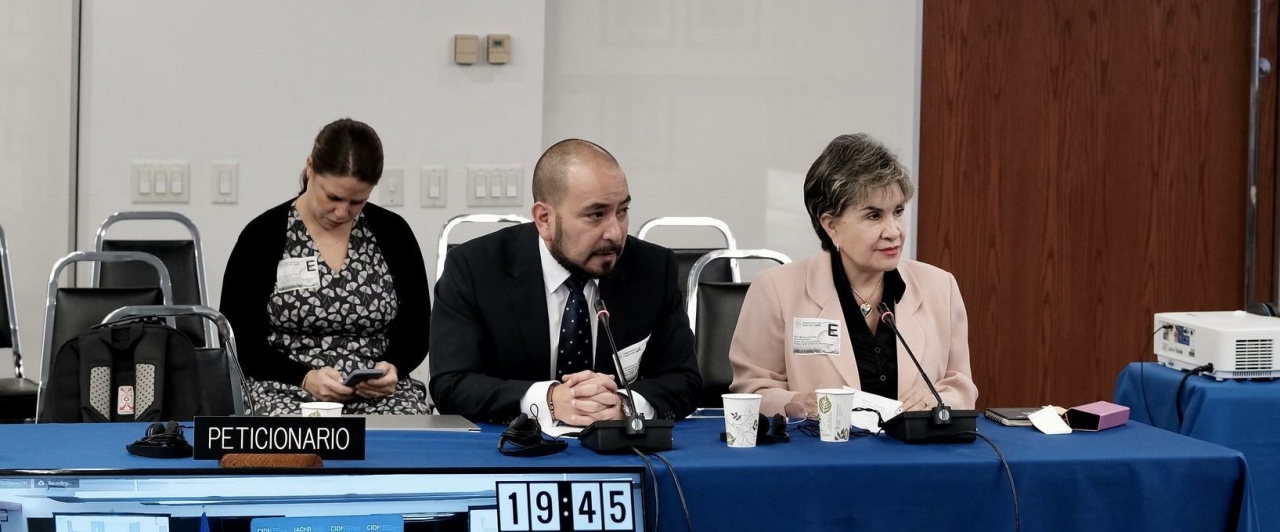Child marriage is disturbingly common in Bolivia. According to UNICEF, Bolivia ranks second in Latin America for girls ages 15-17 who report being currently married or living with a man. Indigenous girls and those with only a primary school education are most affected, with rates reaching up to 58% in some areas.
To confront this issue, the Inter-American Commission on Human Rights (IACHR) recently held a public hearing on “child, early and forced marriage” in Bolivia. Responding to testimony Ipas Bolivia presented at the hearing, Bolivian government officials promised to take action to address the child marriage crisis.
Ipas Bolivia Director Dr. Malena Morales and Policy Coordinator Martín Vidaurre (pictured above) presented testimony at the hearing. They said the harmful practice of child marriage often leads to early and unintended pregnancies, which, in turn, can result in girls and adolescents resorting to abortion by unsafe methods. They also testified that regulatory gaps in Bolivia’s law and “Family Code” policy, combined with the many barriers to safe and legal abortion, allow for a continued violation of children’s rights.
As Ipas Bolivia and others at the hearing discussed, girls in unregistered unions and marriages face serious physical, psychological and health impacts. Their education and personal development stalls, which can lead to growing isolation and depression. Many experience domestic violence and marital rape, causing life-long symptoms of childhood sexual abuse and post-traumatic stress. They also face high rates of pregnancy, which puts them at risk of serious and sometimes life-threatening health complications.
Morales says the public hearing provided Ipas Bolivia “a crucial platform” to expose the reality and challenges related to child marriage and unregistered unions and pregnancies for girls and adolescents.
“We emphasized the need for comprehensive strategies to ensure girls and adolescents can fully exercise their reproductive rights,” she says, adding that despite abortion being legal in Bolivia in cases of rape, incest and to save the pregnant person’s life, significant barriers continue to hinder abortion access. For example, parental consent requirements are an obstacle, and some health providers refuse to offer abortion care due to personal beliefs or misinformation about the legality of the service.
“The data is important to show the magnitude of the problem,” said Morales. “But we must recognize that even if it were just one girl, what matters is not the number but the fact that this is a violation of sexual and reproductive human rights,” she said.
Unregistered unions hide an epidemic
Ipas Bolivia presented evidence that the issue is far worse than official records superficially suggest:
- Census data shows that 84% of girls under 18 in Bolivia report being in unregistered unions, not marriages.
- Cross-checked census data reveals 23,770 adolescents aged 15-17 claimed they were currently or had been married or in an unregistered union.
This strongly indicates exceptions to the law and forced early unions.
Bolivian government commits to action
At the hearing, Bolivian government officials responded to Ipas Bolivia’s testimony by stating their commitment to regulatory adjustments and public policies. Bolivia’s vice minister of equal opportunities, Dr. Nadia Cruz Tarifa, acknowledged the issues presented by Ipas Bolivia and pledged to take action to protect the rights of women, girls and adolescents in the country. “The state will substantially reform the Family Code,” said Tarifa, noting they also planned other related reforms. “We not only have to look at the scope of regulatory reform but also how our society allows or encourages this with an acceptance of men controlling women’s bodies,” Tarifa continued. “The Bolivian state intends to make significant advances.”
Learn more about how Ipas is advancing sexual and reproductive health and rights in Bolivia.


